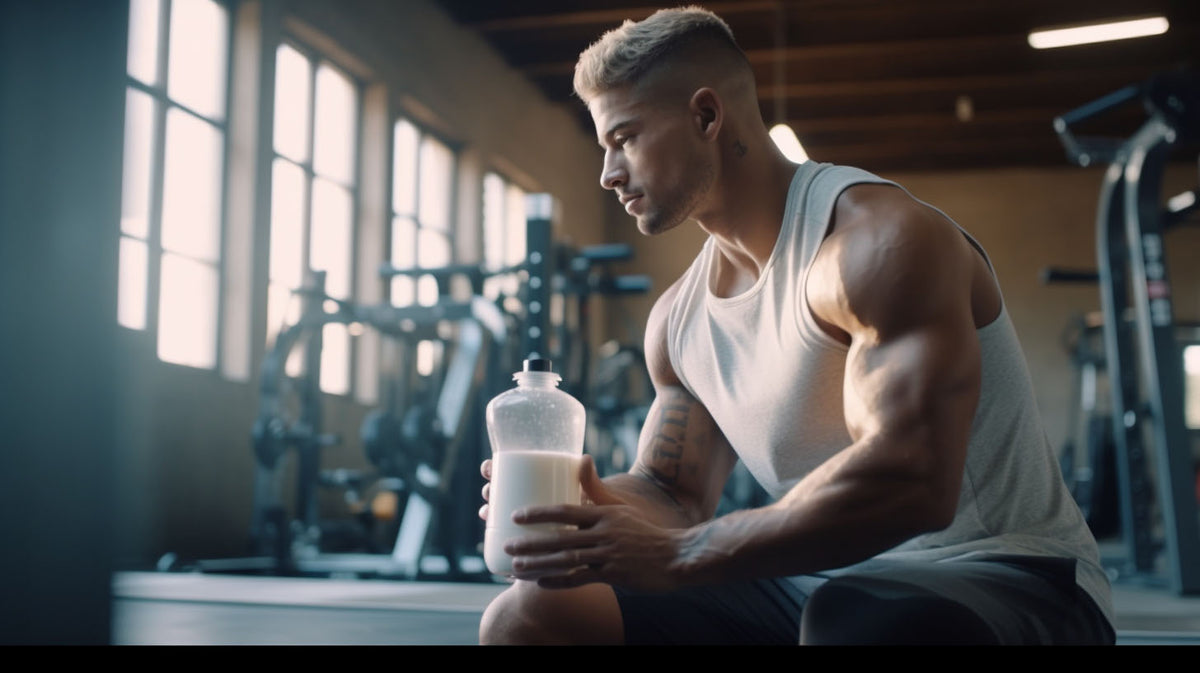
Does Creatine Help Build Muscle? What The Science Says
|
Time to read 4 min
|
Time to read 4 min
In the realm of fitness and bodybuilding, one supplement that has gained substantial popularity is creatine. This compound is often hailed for its potential to enhance muscle growth and improve workout performance. But does creatine truly help build muscle? This article aims to delve into this question, providing a comprehensive understanding of creatine and its role in muscle development.
Creatine is a naturally occurring compound in the human body, primarily found in the muscles and brain. It's also present in certain foods, like red meat and seafood, and is a popular supplement among athletes and bodybuilders.
Over 90% of creatine in our bodies is stored in the muscles, where it plays a critical role in energy production. During high-intensity exercise, creatine is used to produce ATP (adenosine triphosphate), the primary energy molecule in our cells. This is why creatine is particularly important for those engaging in strenuous physical activities, as it helps fuel the muscles during workouts.
When you exercise, your muscles need energy to contract. This energy is provided by ATP. However, your muscles' natural ATP stores are limited and can be depleted quickly during intense exercise. This is where creatine comes into play.
Creatine is stored in your muscles as creatine phosphate. When ATP is used for energy, it loses a phosphate group and becomes ADP (adenosine diphosphate). Creatine phosphate can donate its phosphate group to ADP, regenerating it back into ATP. This process helps maintain ATP levels during high-intensity, short-duration exercises, such as weight lifting or sprinting.
Moreover, creatine contributes to muscle growth in several ways. It can increase the water content of muscle cells, a phenomenon known as cell volumization, which may promote muscle growth. Additionally, creatine can stimulate the formation of proteins that create new muscle fibers, further contributing to muscle mass and strength.
Yes, creatine does indeed help to build muscle. Creatine supplementation is backed by numerous scientific studies, showing it can help muscle growth, enhance strength, and improve exercise performance.
Creatine is known to enhance strength and power output during high-intensity exercise. This means that with creatine, you can lift heavier weights, do more repetitions, or run faster. This increased performance can lead to better workout results and, consequently, more muscle growth.
Furthermore, creatine is also beneficial for muscle recovery post-workout. After an intense workout, your muscles need to recover and repair themselves, and creatine can aid in this process. There are also potential cognitive benefits associated with creatine, with some research suggesting that creatine can help improve brain function.
The muscle-building effects of creatine are well-supported by scientific research. Numerous studies have shown that creatine supplementation can lead to greater gains in muscle mass and strength.
One meta-analysis looked at 22 studies on creatine and found that those who took creatine had greater increases in muscle mass and strength compared to those who took a placebo.
In addition to its effects on muscle mass and strength, creatine has also been shown to enhance muscle recovery and performance. Creatine helps to replenish the energy stores in your muscles, allowing you to maintain high-intensity exercise for longer periods. This means that you can have more productive workouts, leading to greater muscle growth over time.
Try our tasty AF creatine gummies today
To maximize the muscle-building benefits of creatine, it's important to use it correctly. Here are some guidelines to follow:
Dosage: A common approach to creatine supplementation involves a "loading phase" and a "maintenance phase". During the loading phase, you take a higher dose of creatine (20 grams per day) for 5-7 days. This is followed by the maintenance phase, where you take a lower dose (3-5 grams per day) to maintain your creatine levels.
Timing: While the timing of creatine supplementation is not crucial, some research suggests that taking creatine after your workout may be slightly more beneficial.
It's important to note that creatine supplementation should be combined with resistance training for the best results. Creatine can enhance your workouts, but it's the workouts themselves that stimulate muscle growth.
While creatine is generally considered safe for most people, it can cause some side effects. These can include water retention and digestive issues, especially if creatine is taken in large doses.
There is also some concern that long-term, excessive use of creatine could potentially harm the kidneys. However, the research on this is mixed, and most studies have not found a link between creatine use and kidney damage in healthy individuals.
People with kidney disease or those at risk for kidney disease should avoid creatine. As always, it's best to consult with a healthcare provider before starting any new supplement regimen. They can provide personalized advice based on your health history and current medications.
Creatine is a powerful supplement that can help build muscle, enhance strength, and improve workout performance. While it's not a magic pill, when used correctly and combined with regular resistance training, creatine can be a valuable tool in your muscle-building arsenal.
Yes, creatine does help build muscle. It aids in the production of ATP, the primary energy source for muscle contraction. This allows for more intense workouts, leading to greater muscle growth over time. Additionally, creatine can stimulate the formation of proteins that create new muscle fibers, contributing to increased muscle mass.
Creatine and protein serve different roles in muscle building. Creatine helps improve workout performance and stimulates muscle growth, while protein provides the building blocks (amino acids) needed for muscle repair and growth. Both are important for optimal muscle development, and one doesn't necessarily build muscle more than the other. They work best in conjunction.
Creatine primarily helps increase muscle mass, not fat. It aids in energy production during high-intensity workouts, leading to more effective workouts and, over time, muscle growth. While creatine can cause water retention, which may be mistaken for weight gain, it does not directly lead to an increase in fat.
